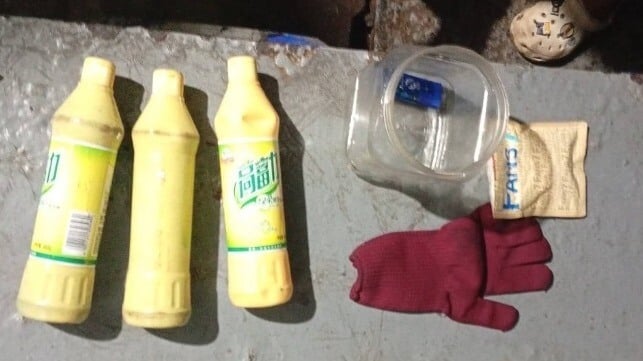Philippines Conducts Rare Interdiction Targeting Chinese Fishermen

In a rare intercept and boarding operation, Philippine personnel seized alleged illegal fishing equipment from a Chinese boat near the BRP Sierra Madre, the decaying WWII landing ship that serves as a makeshift outpost at Second Thomas Shoal.
The Sierra Madre is a longtime flashpoint between Chinese and Philippine forces: China claims Second Thomas Shoal as its own, and has demanded that Manila withdraw and remove the wrecked landing craft from the reef. Chinese forces have repeatedly attempted to blockade the outpost, and in years past, water-cannoning and close-quarters maneuvers were tactics of choice for the China Coast Guard when encountering a Philippine supply convoy near the Sierra Madre. In June 2024, the site saw the most violent confrontation between China and the Philippines yet: during a supply drop, China Coast Guard personnel attacked a group of Philippine Marines in small craft alongside the base, costing one Filipino soldier his thumb and injuring others.
Last week's interaction was initiated not by China but by Philippine forces, a rare occurrence in a conflict marked generally by restraint from Manila's side. On October 24, Chinese fishing boats were operating "unauthorized" near Second Thomas Shoal, as is common in an area patrolled heavily by China's "maritime militia" state-sponsored fishing enterprises. This time, AFP forces intercepted the boat and confiscated illegal fishing gear - an unusually assertive response.
Among other items recovered from the Chinese boats, AFP forces claim to have seized bottles of cyanide, used to stun reef fish for live capture for the aquarium trade. This is an efficient method to extract economic value from pristine reef habitats, and is commonly practiced throughout Southeast Asia - notably in the fishing communities of the western Philippines. It has the unwanted side effect of killing coral, undermining the fishery's future productivity.
The boarding was certain to draw a forceful response from Beijing. In a pointed essay circulated by the People's Liberation Army, Chinese national interest scholar Ding Duo accused the Philippines of "banditry," "provocation, deliberate evidence fabrication, and a cynical propaganda campaign." He asserted that the Philippine troops damaged the boat's engine and dragged the vessel off, causing property damage and physical harm to the Chinese fishermen. He further suggested that the alleged cyanide bottles were nothing more than containers of a common brand of Chinese dish soap.
"The Philippines has perfected what can only be described as 'victimhood diplomacy' - orchestrating confrontations, selectively leaking images, and presenting carefully crafted narratives to dominate media cycles and solicit international sympathy," asserted Ding.
Second Thomas Shoal is within the Philippines' 200-nautical-mile EEZ boundary and 700 nautical miles away from mainland China; it submerges at high tide and does not constitute land for the purposes of UNCLOS claims. Despite the distance from its shores and its lack of jurisdiction under international law, China claims the reef - and the vast majority of the rest of the South China Sea - as its own. The Permanent Court of Arbitration in the Hague rejected these sweeping claims in 2016, finding them inconsistent with UNCLOS, but China refused to participate in the proceeding or to acknowledge the ruling.
